May 14, 2021

The annual “threat assessment” published by the US intelligence community says Iran does not appear to be doing anything to develop a nuclear weapon.
Interestingly, the report, dated April 9,says the regime is likely to consider enriching up to 60 percent if it does not receive any sanctions relief. And just four days later, on April 13, the Islamic Republic publicly announced it was going to enrich up to 60 percent.
Iran said the decision was made in retaliation for an explosion at the Natanz nuclear complex that crashed the electrical system inside the complex.
But it also had the effect of showing that the US intelligence community has its finger on the pulse of the regime.
The analysis of Iran appeared in the “Annual Threat Assessment” of the US “intelligence community,” a term that refers to all 17 intelligence agencies, which includes the Central Intelligence Agency, the National Security Agency, which spies on electronic communications, the National Reconnaissance Agen-cy, which runs satellites, the intelligence arms of the four military services and assorted other mostly specialized intelligence agencies in the FBI, the Treasury Department and the Drug Enforcement Agency.
The latest report is called “annual” although there was no report issued in the previous two years because the Trump Administration objected to the intelligence analysts’ criticism of Russia. The last report that was issued warned the country of threat of an epidemic, which proved very prescient—as did this year’s prediction of Iran’s going to 60 percent enrichment.
This year’s report cites four countries as particular problems for the United States—China, for its effort to obtain global power, and Russia, North Korea and Iran for “provocative actions.”
More than 10 percent of the report is devoted to Iran.
The report concludes, “Iran will present a continuing threat to US and allied interests in the region as it tries to erode US influence and support Shia populations abroad, entrench its influence and project power in neighboring states, deflect international pressure, and minimize threats to regime stability.”
But despite its efforts, “Iran’s deteriorating economy and poor regional reputation present obstacles to its goals.”
On the key issue for most Americans, Iran’s nuclear program, the intelligence report says flatly, “We continue to assess that Iran is not currently undertaking the key nuclear weapons-development activities that we judge would be necessary to produce a nuclear device…. If Tehran does not receive sanctions relief, Iranian officials probably will consider options ranging from further enriching uranium up to 60 percent to designing and building a new 40-Megawatt Heavy Water reactor.”
The intelligence agencies said Iran’s animosity for the United States is deeply-woven into the state’s character. “Iran sees itself as locked in a struggle with the United States and its regional allies, whom they perceive to be focused on curtailing Iran’s geopolitical influence and pursuing regime change.”
But it sees the regime as pragmatic and unwilling to go too far and risk the death of the regime itself. “Iran’s willingness to conduct attacks probably will hinge on its perception of the United States’ willingness to respond, its ability to conduct attacks without triggering direct conflict, and the prospect of jeopardizing potential US sanctions relief…. Iran remains committed to countering US pressure, although Tehran is also wary of becoming involved in a full-blown conflict.”
It says Iraq “will be the key battleground for Iran’s influence this year and during the next several years, and Iranian-supported Iraqi Shia militias will continue to pose the primary threat to US personnel in Iraq…. Tehran continues to leverage ties to Iraqi Shia groups and leaders to circumvent US sanctions and try to force the United States to withdraw through political pressure and kinetic strikes,” the US term for military attacks.
“Although Tehran remains an influential external actor in Iraq, Iraqi politicians, such as Prime Minister Mustafa al-Kadhimi, will attempt to balance Baghdad’s relations with Iran and the United States in an effort to avoid Iraq becoming an arena for conflict between the two countries.”
As for Syria, “Iran is determined to maintain influence in Syria. Iran is pursuing a permanent military presence and economic deals in Syria as the conflict winds down there. Tehran almost certainly wants these things to build its regional influence, support Hezbollah, and threaten Israel.”